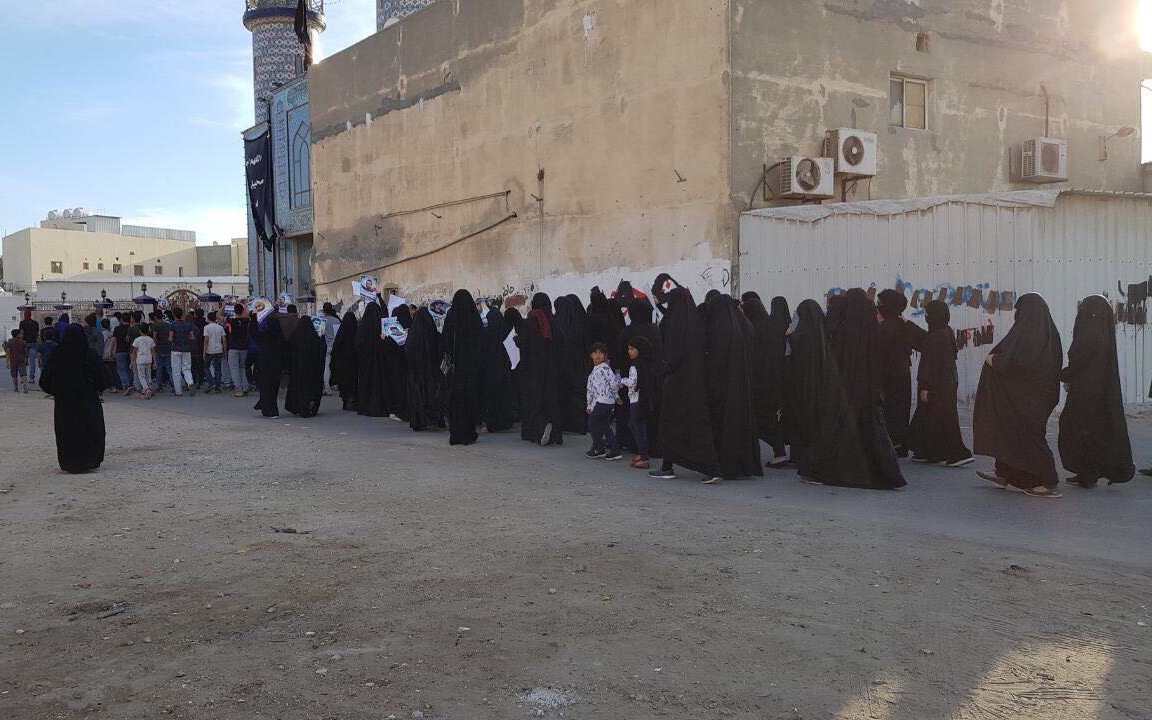26 December 2017 – On 25 December 2017, a Bahraini military court sentenced six men to death on charges of forming a terrorist cell and plotting to assassinate a military official. The men, five of whom are Shia and one of whom is Sunni, also had their citizenship revoked. With their convictions, Bahrain has sentenced 14 men to death in 2017, a dramatic increase in the use of capital punishment. Americans for Democracy & Human Rights in Bahrain (ADHRB) condemns the sentences in the strongest terms and calls on Bahrain to immediately declare a moratorium on the use of the death penalty pending its complete abolition.
Bahrain’s Military High Court issued its ruling in the case of 18 men, who had been accused of being part of a terrorist cell. The court sentenced six men, Mubarak Adel Mubarak Mahanna, Sayed Fadhel Abbas Hassan Radhi, Sayed Alawi Sayed Husain Alawi, Mohammed Abdulhassan Al Mutaghwi, Murtada Majeed Ramadan Alawi, and Habeeb Abdullah Hassan Ali to death. It sentenced seven other men to seven years in prison, and stripped them of their nationality and acquitted five defendants.
The government tried and convicted the men in trials before the country’s military courts, the Bahrain Defence Force’s internal judiciary, rather than courts overseen by civilian authorities. These courts, which are similar to the National Safety Courts (NSC) that operated in the aftermath of the 2011 pro-democracy protests, are noted for their lack of fair trials, opacity, and acceptance of torture-induced confessions. After the 2011 protests, the government disbanded the National Safety Courts, and Bahrain’s constitution continued to prohibit military trials of civilians unless a state of emergency is declared. However, on 3 April 2017, Bahrain’s king amended the constitution to grant the standard military judiciary the power to try civilians in national security cases, even under normal circumstances. On 24 October 2017, the Bahraini government began the first trial of civilians in military courts since 2011, with Sayed Alawi Sayed Husain Alawi, Sayed Fadhel Abbas Hassan Radhi, Mohammed Abdulhassan Al Mutaghwi, and Muhammed Husain Al Shehabi as the first defendants.
Sayed Alawi Sayed Husain Alawi is an engineer by training and a repair inspector for the Bahrain Telecommunications Company. He was last seen at his work on 24 October 2016. He was abducted by armed men in civilian clothing, forcibly disappeared, and detained incommunicado. He was not allowed to call his family until the end of November – one month after he was disappeared – nor did the authorities tell his family where he was. Over the course of five-and-a-half months, from October 2016 until the end of February 2017, he was not allowed to have a half-hour conversation with his family. In October 2017, authorities announced that he, along with three others, were in military custody and faced trial before a military court on terror-related charges.
Sayed Fadhel Abbas Hassan Radhi was detained by security forces under the authority of the Ministry of Interior, at his home on 28 September 2016. He was detained and forcibly disappeared incommunicado. The Office of Public Prosecution refused to disclose the charges he faced, saying only that he was a defendant in a terrorism case. On 9 May 2017, Amnesty International reported that “Bahrain’s public prosecution referred Radhi’s case to a military court,” marking the first usage of Bahrain’s newly revised Constitution to allow for military trials of civilians since 2011. During his detention and disappearance, he has only been able to call his relatives briefly six times.
“The human rights climate in Bahrain has been deteriorating since mid-2016, as Bahraini authorities continue to restrict fundamental freedoms,” said Husain Abdulla, Executive Director of ADHRB. “However, these new death sentences mark a new low. The full-scale prosecution of peaceful dissidents and protesters in the country’s military courts shows the authorities will continue to not only criminalize and target peaceful dissent and internationally-recognized human rights, but will flout international standards of judicial procedures. The military courts are fundamentally unequipped to respect fair trial norms, dismiss allegations of torture, and demonstrate judicial transparency. The international community must speak out and pressure Bahrain to reverse these judgements and void all charges against the defendants.”
ADHRB condemns in the strongest terms the new death sentences against the six men that came out of unfair trials and after extended periods of arbitrary detention, enforced disappearance, and possible torture. Bahrain’s military courts are structurally incapable of issuing judgements that accord with international standards of fair trials and due process. The government must void the verdicts and immediately and unconditionally release the men. Bahrain must further institute an immediate moratorium on the death penalty before abolishing capital punishment.
Correction: The original version of the statement suggested that the Bahrain Defence Force military judiciary is the same as the 2011 National Safety Courts. In fact, the NSC were emergency military tribunals established after the king declared a State of National Safety in response to the mass pro-democracy protests. While they operate very similarly to the standard military judiciary, therefore raising the risk of similar due process violations, they are different entities. The king was constitutionally empowered to establish the NSC in times of emergency before the April 2017 constitutional amendment; what the latter does is empower the normal military courts to try civilians under ordinary circumstances, without a State of National Safety or Martial law ever being formally declared. The statement has been adjusted to reflect this distinction.





